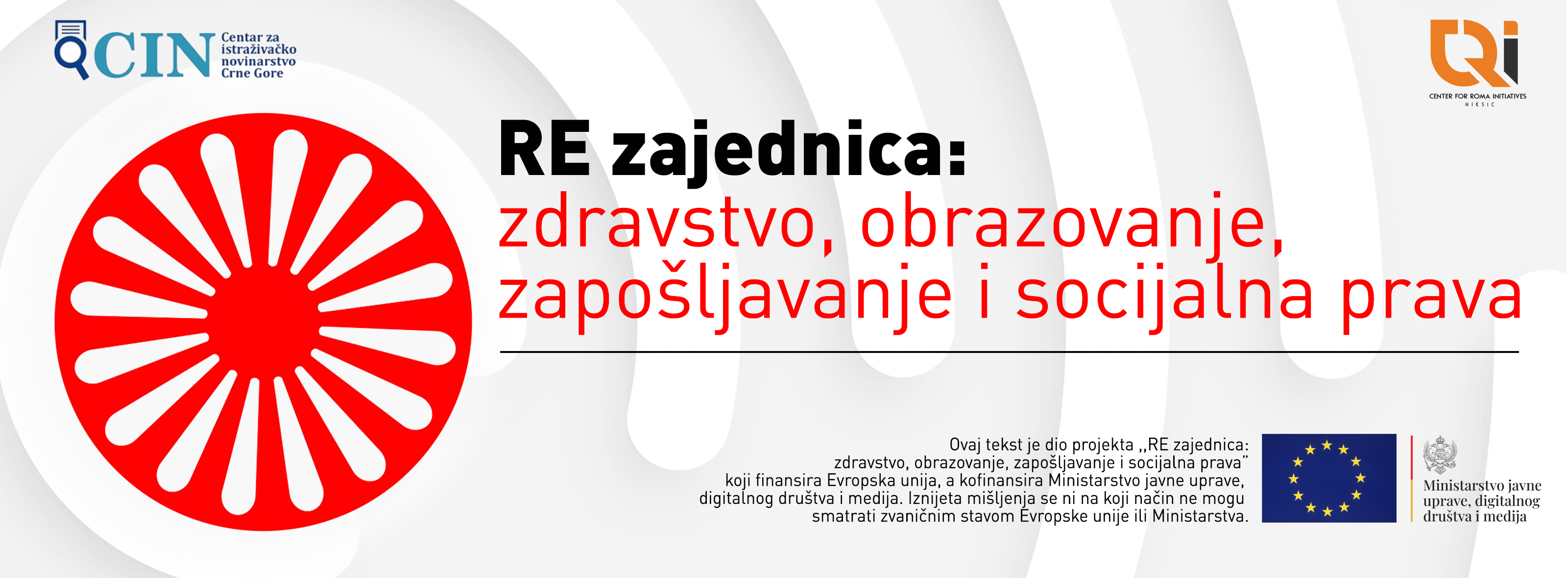HATE SPEECH TARGETING THE RE COMMUNITY: LEGAL RESTRICTIONS AS THE ONLY SOLUTION

NO PENALTIES FOR POLITICIANS SPREADING HATE SPEECH - THEY ENCOURAGE DISCRIMINATION AND PREJUDICE
Miloš RUDOVIĆ
"Scabies," "dirty," and "arrogant garbage collectors" are just some of the comments that Montenegrin students, as well as some politicians, used to describe members of the Roma and Egyptian (RE) nationality. Comments on social networks pose a serious problem, and cases reported to the authorities generally remain unresolved. Interlocutors of the Center for Investigative Journalism of Montenegro (CIN-CG) agree that this problem can be reduced when those who incite hatred towards the Roma community are held accountable.
The latest European Commission (EC) report pointed out that vulnerable groups, including the RE population, were increasingly subjected to discrimination, hate speech, and hate crimes.
"Roma and Egyptians are the most vulnerable and discriminated persons belonging to minorities," the EC report states.
The Institution of the Protector of Human Rights and Freedoms had its hands full this year.
The Protector acted on the complaint of the Roma Council, regarding the Viber communication of students of the Faculty of Architecture of the University of Montenegro, with the objection that it contains elements of discrimination and hate speech against Roma. The students' communication went public by sharing photos of the correspondence on the social network Instagram.
This institution determined that the disputed communication abounded with insulting and humiliating comments that ridiculed and labeled the Roma from the Konik settlement in Podgorica as "scabby" and "dirty," which, according to the opinion of the Deputy Protector Nerma Dobardžić, deepened the ethnic distance towards to this community. She assessed that the disputed communication is incompatible with the values of democracy and human rights and that, according to the Convention for the Protection of Human Rights and Fundamental Freedoms, it cannot enjoy the protection of the right to freedom of expression. In the end, the institution of the Protector sent recommendations to the University of Montenegro to organize training on the prevention of hate speech for these students.
Also, this year, the Protector investigated the violation of human rights and freedoms on its initiative on the occasion of the project "Montenegro without division," which was implemented by the non-governmental organization Montenegrin Cultural Network (MCN). The reason for initiating the procedure is the presentation of Roma as workers of a utility company, while the others are shown in national costumes represented in Montenegro. This procedure is ongoing. MCN criticized those who noticed the omission, trying to justify themselves by allegedly not being able to find suitable costumes for the representatives of the Roma community. "Generally speaking, in the public space of Montenegro, offensive, discriminatory, and stigmatizing speech towards members of the RE population is more pronounced online - through comments and other types of posts on portals and social networks. Content and 'jokes' that still stereotypically portray the Roma, i.e., their way of life are often shared" the institution of the Protector stated that in previous cases, they failed to identify the perpetrators and point out the negative attitude towards this community.
So far no legal accountability for spreading hate speech
Savo Niković, a member of the city assembly of the Democrats in Herceg Novi, stated at a recent session that "very arrogant garbage collectors of Roma nationality" are not doing their job well. This case was also reported to the Ombudsman. Niković then apologized for his comments, stating that he did not target members of the RE population but utility workers.
"As for public officials, they are expected to be promoters of the democratic principles of equality and inclusion and not to insult the dignity of members of minority nations in any way. Insisting on determining individual responsibility is also one of the ways to efficiently fight against all anomalies and illegalities in the public administration system. In addition, it is necessary to strengthen ethical discipline, and in cases where there are grounds and conditions for this, encourage misdemeanor and criminal responsibility", the institution of the Protector stated for CIN-CG.
Bojana Malović, a legal advisor at the NGO Action for Human Rights (HRA), said that politicians must be aware of their influence on citizens, which makes the degree of responsibility for everything said in public discourse even greater.
"Statements like this of Mr. Niković should be sanctioned to show that such attitudes are contrary to the values of Montenegro, which are protected by its legal order. In this case, it is good and important that he immediately apologized", she told CIN-CG.
The President of the Municipal Assembly of Herceg Novi, Ivan Otović, did not answer CIN-CG's questions about whether he intends to raise the issue of responsibility for the defendant Niković's comment.
The Statute of the Municipality of Herceg Novi stipulates that local officials must adhere to the code of ethics.
The party of Alekse Bečić did not answer whether the Ethics Committee of the Democrats will deal with Niković's cases.
The President of the Municipality, Stevan Katic, told CIN-CG that emphasizing the nationality of utility company workers in Nikovic's speech "does not reflect the attitude of Democratic Montenegro towards members of the Roma nationality and utility company workers."
"His statement was reckless, which Niković himself admitted and apologized to members of the Roma nationality, stressing that it was not his intention to hurt and disparage anyone," Katic said.
The head of the Center for Roma Initiatives (CRI), Fana Delija, said that this was not an isolated case and that even some MPs in the Parliament of Montenegro were not worried about the speech. "Some politicians publicly call with 'a Gypsy woman for divination'. Milan Knežević, Member of Parliament, wrote on the social network Twitter: "Send the number of that gypsy woman who does fortune-telling. Maybe she knows something more." Numerous examples could be cited, but the statements of religious leaders, such as, for example, Metropolitan of the Montenegrin Orthodox Church (MOC) Mihailo, who described the signing of the Basic Agreement with the metaphor: "Gypsy work," she stated, are worrying.
The project coordinator of the Roma youth organization "Walk with Us - Phiren Amenca" Andrija Đukanović, said that the increasingly frequent hate speech against Roma coming from public officials, religious leaders, and representatives of civil society is undoubtedly worrying and shows that the problem of discrimination against that community is prevalent even among those who should have greater accountability for what they said."
If roughly speaking, we are 'used' to discrimination and hate speech among ordinary citizens, which does not mean that it is less dangerous, we are surprised that hate speech is present among those who should be aware of the harmfulness of this phenomenon. That is why we believe that Niković's accountability is much more significant and that hate speech, in his case, can produce severe consequences", Đukanović said for CIN-CG.
Ban public action as in Belgium
Hate speech can be prosecuted criminally and as a misdemeanor. In Montenegro, two criminal offenses are applied on the basis of which one can be charged for hate speech - Inciting national, racial, and religious hatred and Racial and other discrimination.
The border between criminal acts and misdemeanors in this area is not precisely defined by law, the HRA representative points out, which creates problems in practice and leads to different qualifications of the same or similar expressions.
"Therefore, whenever hate speech has a greater reach, that is, when it can lead to more serious consequences, it should be qualified as a criminal offense. Thus, for example, for the criminal offense of Racial and other discrimination, whoever 'propagates hatred or intolerance' should be punished, and whoever 'insults another' on any grounds based on intolerance, including intolerance expressed in the form of nationalism, discrimination and hostility against minorities should be punished with a misdemeanor", Malović states.
Malović points out that the results so far in the fight against hate speech in Montenegro are not at an adequate level and that no methods for an effective fight have been found, which is why it has become more frequent lately.
"Numerous cases remain unprocessed, especially when hate speech comes from the political elites, which needs to be changed. Institutions must take a more decisive and harsh stance towards hate speech and adequately process each case. We are not talking here about imposing prison sentences at any cost. The problem can be solved with fines, community sentence, which have not been imposed so far, or, for example, with a court-ordered apology", she states.
By amending the Law on Public Order and Peace and the Law on Misdemeanors, judges should be able to issue protective measure bans of phone calls, activities, or duties for six months or more for spreading hate speech. Malović states an example from Belgium, where the court declared a politician ineligible to stand for parliament for ten years for hate speech against immigrants, along with 250 hours of community work.
Delija points out that one of the ways to suppress hate speech is the active participation of the targeted individual or group in solving the issues arising from the topic of the address. In this way, she points out, the group that is in an "unfavorable position" will be strengthened, and at the same time, the possibility of repeated victimization will be reduced.
Andrija Đukanović states that hate speech can be suppressed through sanctions and education. He believes that education is the best way for citizens to build the values of understanding and tolerance.
"It is essential that through the education system, children and young people are educated about Roma culture and tradition and thus overcome prejudices. The responsibility for suppressing hate speech lies with the media and public office holders who must take care of the way of communication," he said, adding that an effective response is needed from institutions, primarily judicial ones, which must sanction cases of hate speech when they occur. According to him, harsher sanctions would have a preventive effect on suppressing future cases of hate speech because it would be clear that such a way of communication is unacceptable.
This problem is also present in the entire region. Through a regional project, the London-based organization Reporting Diversity Network (RDN) noted an increase in hate speech in the Western Balkans. One of the numerous cases is that a teacher at the economic high school in Tetovo made offensive comments on her Facebook account towards the Roma community during International Roma Day. In her post, she stated that she did not understand why the Roma people were celebrated. She further humiliated them by saying that they were lazy and wanted everything given to them without investing any effort.
"I do not understand why you feel so sorry for the Roma. There are some of them in my neighborhood, and I know them very well. If they had a little more power, they would make us – Albanians – disappear. […] Nobody forbids their education; they do not want to work, and they want everything given to them on a plate," she wrote.
RDN states that the fact that a high school teacher from North Macedonia makes such comments harms the public discourse in the country and encourages hate speech against the Roma community. Moreover, as a figure who should represent authority to the students, the teacher could incite additional hatred among the younger generations of non-Roma students but also contribute to the Roma students feeling even more marginalized.
Suppressing discriminatory and hateful speech toward the RE population is impossible without an adequate response from the institutions. As noted by European officials, sanctioning those responsible and tolerating such comments create a problem.


